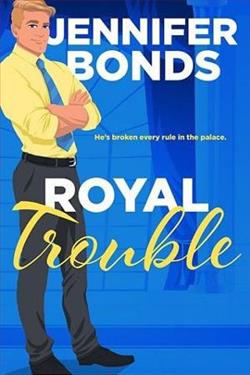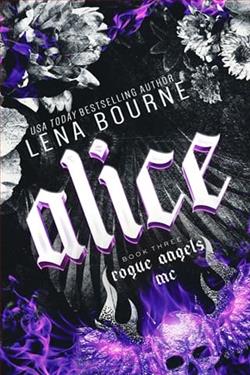Page 83 of Her Ruse with the Rakish Duke
Daphne felt Victor’s warmth beside her and she smiled.
“How did you say it?” she turned to him, her eyes twinkling. “Like stars dotting a moonlit sky.”
When Victor wanted to commission a portrait of them, she had thought him ridiculous. It was romantic, it was generous, but that was the problem. People got tired of staring at the freckles on her face in real life; it was generous of him to believe they would want to suffer them any longer, especially when they’d be on display in their home.
She was never insecure about her stars, as he called them.
The portrait, however, was marvelous. Marvelously magnificent. The size was pompous. She hadn’t expected such an egregious commission.
When she stood in the entrance hall beside Victor to see their portrait being hung, she gasped.
The woman staring at her couldn’t have been her. For one, she was beautiful. No one called her beautiful except her husband. The woman in the portrait would never be called beautiful out of politeness or through the rosy view of love.
The freckles dotting her cheeks were there. Not covered by white paint, not forgotten. Her skin wasn’t glossed over. She was illustrated in her natural state, but she looked beautiful. She had the man standing beside her to thank for this.
The portrait captured Victor’s cool, intense gaze. And his handsomeness. He was rightfully a duke; he had the air of a nobleman around him. The type of nobility that intimidated men like Percy Farton. He was everyone’s object of envy; a duke, a soldier to propriety and protocols; a wealthy aristocrat, nearing royalty.
But the duke wasn’t who she had come to love. It was the man himself. She preferred the warmth of the real person. His cheeky smile. Victor Anderson, who didn’t act like a duke. She loved that vulgar mouth of his, and the eccentricities of his behavior that would scandalize theton. She loved the journey that it took to get them both here. She loved the things about him that he didn’t realize needed loving.
His back was one. She would spend their marriage kissing his scars and telling him how beautiful he was. On the days he would doubt himself, she would hold his hand and never let go.
She placed her hand on his back, stroking the scars over the fabric of his clothes.
He was the first man not to grit his teeth at the spots on her face. He never chased her out of the ballroom with derision to her person; he loved her earnestly. “The poets do not compare to the eloquence of my husband.” She teased him, but she ended up feeling the weight of her words more than he.Her husband. Her heart fluttered.
“You flatter me, my wife.” They felt the solemnity of her words equally. As equals. They were equals now. Man and woman. Wife and husband. They had found love and had chosen to protect it together.
“I believe you should write a book.”
Victor quirked a brow, amused as she continued. Her teasing smile wrinkled her lips and her eyes shone with mischief.
After they had wed, she demanded to be allowed all the teasing she could for the entirety of the marriage. It was only fair, considering he had been such a nerve-racking presence before the inception of their courtship.
“It would be a very lucrative business for the dukedom. If our estates were to go bankrupt you would save us with literature,” she continued. Victor nodded attentively as if ready to summon his solicitors. “Wouldn’t you want to go down in history as an aristocratic Shakespeare?”
“A few weeks ago, I would have said yes. I would have also challenged anyone that brought up my prolificacy in literature to a duel.” She realized he admitted tacitly to having relations with poetry writing and her brows furrowed.
“Are you actually a poet?”
He nodded.
“Poetry?” She laughed.
“You are the muse to all my pieces.”
“Are you serious?”
Who was this man? Victor could charm with his words but only because he was a well-practiced rake. Flirting came naturally to him, as did highborn language. He would not hide a second personality or at least a benign interest. She knew everything there was to know about him, and a feat such as flowery compositions was not something she felt she would have no knowledge about.
“A drunk man sings the most beautiful ballads. And I was intoxicated with you from the very first taste of your lips,” He took her hands in his and smiled. His smile was boyish and timid, unlike his usual confident self.
He wrote about her. “You have never told me this.”
Her father had called love a silly game of flowers and poetry. And he had been right. She was being told by a grinning husband about the poetry he had written in her honor. He wrote about her. Not many women received stanzas but she just so happened to be among the few. Perhaps someone would consider that silly, but Daphne never would.
“I spent those four years yearning for you.” He cupped her cheeks and rested his forehead on hers. “I did not want to give myself hope. I did not want to give us hope. I thought if I could make love to you on the pages, I would be satisfied. But your magnificence burns both ink and paper.”
“You love me.” Her eyes watered as she came to the realization. It wasn’t just a proclamation anymore, it was a bundle of actions. He loved her by being by her side, he loved her by marrying her, he loved her by yearning after her, he loved her by portraying her in such a manner that transcended divinity, and he would keep on loving her.















